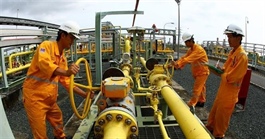Gasoline prices fall, consumer goods prices still high in Vietnam
Gasoline prices fall, consumer goods prices still high in Vietnam
Gasoline prices were lowered several times in Vietnam this year and state agencies ordered enterprises to review and revise their prices, but few are slashing goods prices.

Many items are even trending upward.
Experts forecast the prices of goods will continue to rise during the peak of the consumption season at the end of the year, especially during the Lunar New Year holiday, or Tet.
Few firms adjust prices down
After repeatedly asking firms active in the fertilizer, cement, food and foodstuffs, animal feed, and seaport logistics fields to declare prices in line with the regulations, the Ho Chi Minh City Department of Finance received reports on price listings from enterprises in early September.
The number of firms cutting the prices of their products made up a small proportion, while the rest still kept prices unchanged or proposed hiking rates.
One out of 10 rice and sugar enterprises revised goods prices down 5.45-20 percent.
Two out of seven fertilizer firms lowered prices by 10.11-14.6 percent, while two other companies’ prices went up by 22.75 percent.
Among nine steelmakers, five cut prices by five percent, while one out of six animal feed providers raised prices by up to 13.76 percent.
As for goods with stabilized prices, the municipal department said that two grocery store chains, including Saigon Co.op and Bach Hoa Xanh, lowered the price of cooking oil by 6-8.51 percent. Meanwhile, firms proposed maintaining the price of rice as registered from April 1.
In addition, poultry suppliers refused to lower prices, while the group of firms providing instant noodles proposed jacking the price of the product up.
Goods prices mainly pushed up by high prices of materials, not fuels
The stabilized price of eggs keeps rising and now stands at a record high of VND31,500 (US$1.33) per dozen chicken eggs and VND37,000 ($1.56) per dozen duck eggs.
The price soared by VND3,500-4,000 ($0.14-0.16) per dozen compared to the stabilized price in early 2022, but firms insisted that they could not lower the rate.
Truong Chi Thien, general director of Vinh Thanh Dat Food Corporation in Ho Chi Minh City, explained that the input price is at an all-time high of VND2,600-2,800 ($0.1-0.11) per egg and for duck eggs at VND3,300-3,500 ($0.13-0.14) apiece.
The firm found it tough to cut the retail prices of eggs as the input rates soared by about 50 percent.
“Sometimes in the past, the firm incurred losses due to failing to follow the hike in input prices. We will try not to spike the selling price to ease pressure on consumers,” said Thien.
Similarly, many poultry suppliers said that oil and gasoline prices account for 1-4 percent of the total costs, while animal feed costs make up 70-75 percent.
Since May this year, the prices of materials and animal feed have gone up by 35-37 percent, pushing the prices of chicken and duck meat up 18-30 percent. This is why firms could not cut the sale price.
A representative of an instant noodle producer in Ho Chi Minh City told Tuoi Tre (Youth) newspaper on September 9 that the prices of the main materials which represent 80 percent of the total expenses have increased by 15-28 percent against those at the start of the market stabilization program on April 1. Meanwhile, the fuel costs make up a mere three percent.
In contrast, an economic expert in Ho Chi Minh City told Tuoi Tre that the rising input price influences the sales price of goods for sure.
However, it should be re-considered as for the same item, many firms are spiking prices, while some others are keeping them unchanged or are lowering the rates.
Year-end pressure on the local market
According to Thien, despite the record high price of eggs, many poultry farmers are not ready for upsizing their flocks due to the soaring prices of animal feed.
“If the price is kept stable, the local market will enjoy an adequate supply of eggs at a reasonable price at the end of the year," said Thien.
“However, if the input price comes up, egg prices will continue to accelerate, putting pressure on consumers and suppliers."
Nguyen Kim Doan, vice-chairman of the Dong Nai Livestock Association, explained that high input costs, unstable selling prices, and complicated developments of diseases brought the supply of live pigs down.
As such, the country might face a shortage of pork or a spike in pork prices during Tet.
Meanwhile, a representative of MM Mega Market said that the supermarket chain is planning to ramp up its supply of pork to the local market at the end of the year and stockpile goods to ensure price stabilization.
“However, most goods providers have refused to cut prices, making life hard for retailers to offer good prices to consumers unless they accept lower profits to launch promotional programs to drive up consumption,” the representative said.
The consumption of essential goods at the end of the year is expected to surge over 30 percent against normal months.
Therefore, undersupply will send the prices of many items up, said a representative of a supermarket located in Ho Chi Minh City.
“The government should promptly adopt appropriate measures for input material price stabilization to reduce pressure on producers and encourage them to slash the selling price of goods and increase production,” the representative suggested.
Steel prices up after 15 straight price slumps
Domestic steel prices went up in late August and early September this year after 15 straight price drops.
Accordingly, Vietnam Germany Steel Pipe JSC, Hoa Phat, Vietnam-Italy Steel JSC, and Pomina spiked the prices of wire rods and steel bars by VND150,000-200,000 ($6.34-8.45) per ton, exclusive of value-added tax.
Pomina reported the sharpest hike at VND450,000 ($19) for each ton of reinforcing bars to raise the price of this product to VND16.24 million ($687) per ton.
Hoa Phat revised the respective prices of wire rods and reinforcing bars up VND190,000 ($8) and VND150,000 ($6.34) a ton.

























